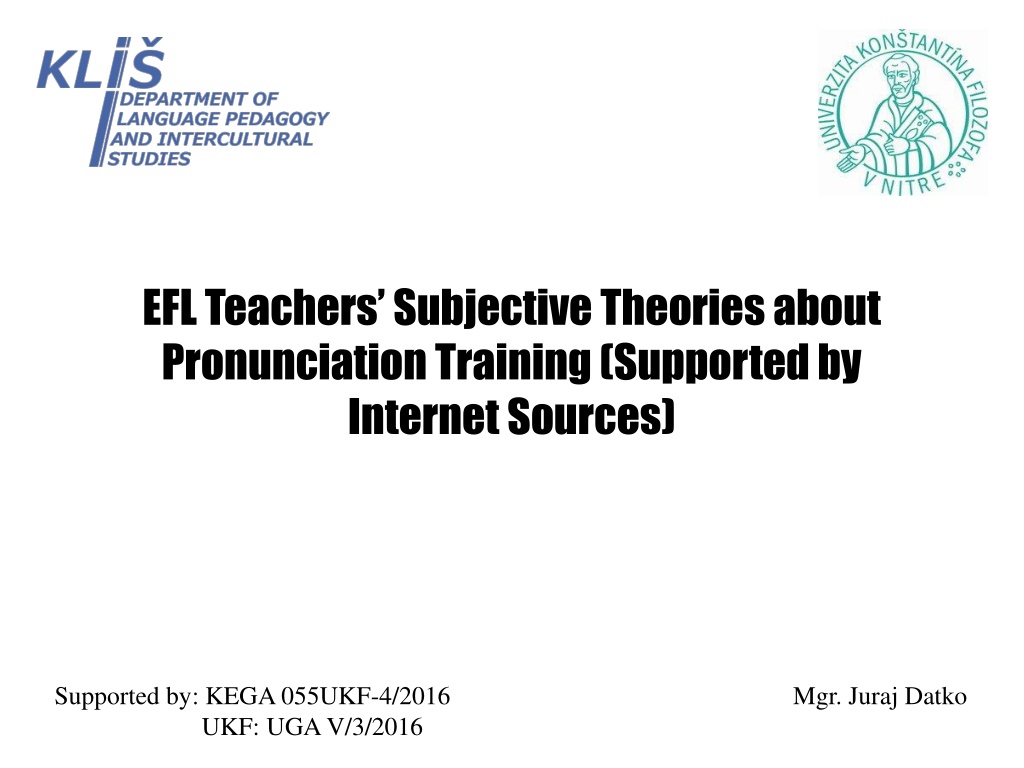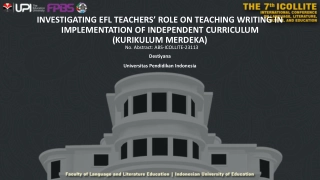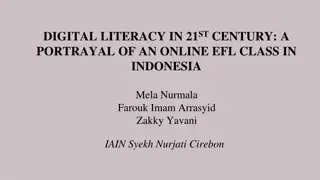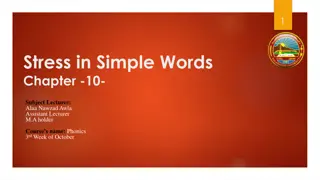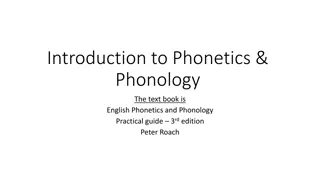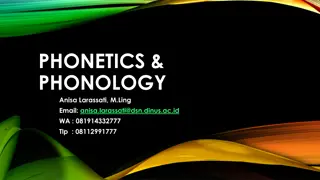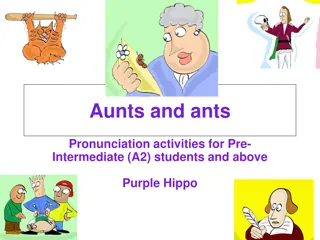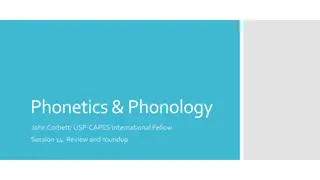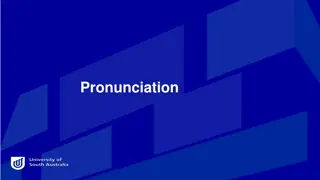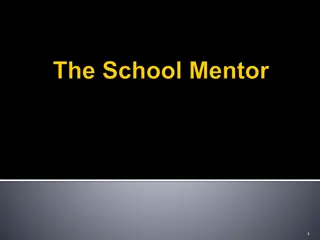Exploring EFL Teachers' Subjective Theories on Pronunciation Training
This study delves into EFL teachers' subjective theories regarding pronunciation training, with a focus on Internet-supported practices. Through semi-structured interviews, 11 high school EFL teachers shared their views and attitudes on the importance of pronunciation training in EFL classrooms, as well as their goals in teaching pronunciation. Qualitative content analysis was used to process the data, revealing insights into teachers' perspectives on these aspects of language instruction.
Download Presentation

Please find below an Image/Link to download the presentation.
The content on the website is provided AS IS for your information and personal use only. It may not be sold, licensed, or shared on other websites without obtaining consent from the author. Download presentation by click this link. If you encounter any issues during the download, it is possible that the publisher has removed the file from their server.
E N D
Presentation Transcript
EFL Teachers Subjective Theories about Pronunciation Training (Supported by Internet Sources) Supported by: KEGA 055UKF-4/2016 UKF: UGA V/3/2016 Mgr. Juraj Datko
Research aim and questions The aim of the presented study is: (1) to explore EFL teachers subjective theories (views, attitudes, perceptions, practices, or suggestions) related to (Internet- supported) pronunciation training. We formulated two research questions, namely: (RQ1) What are the interviewed EFL teachers subjective theories of pronunciation training? (RQ2) What are the interviewed EFL teachers subjective theories of Internet-supported pronunciation training?
Research methodology Datacollection: Semi-structured interviews were used to reconstruct EFL teachers subjective theories. The interviews were audio-recorded, while the researcher also took notes. Dataanalysis: Qualitative content analysis was used to process the transcribed interview data. The coding framework is based on seven analytic categories and a set of twenty-eight codes.
Research sample 11 high school EFLteachers (5 teachers from Doln Kub n and 6 teachers from Nitra) various lengths of pedagogical practice (5 - 38 years of teaching experience)
Research analysis and results Category I: Teachers attitudes towards the importance of pronunciation training in EFL classes Code No. of teachers Example Pronunciation teaching is very important and unavoidable in EFL classrooms. Teachers should not expect their students to acquire correct pronunciation via exposure to English at home . I.) Pronunciation training is important in EFL classes. 4 Pronunciation training is an important element of foreign language teaching and learning, but I would say, that it is even more important for younger learners in the lower levels . II.) Pronunciation training is important in EFL classes, but it is even more important for younger learners starting to learn English. 3 Pronunciation practice is important to a certain degree in our EFL classrooms, but I have some students, no big intellectuals , whose pronunciation has improved through listening to authentic speech in movies and on the Internet . III.) Pronunciation training is important in EFL classes, but students can also benefit from exposure to English outside the classroom. 3 It is not important to focus on pronunciation training during English lessons. Learners train their pronunciation implicitly at home . IV.) Pronunciation training is not important in EFL classes. 1
Category II: The goal of pronunciation training as set by EFL teachers Code No. of teachers Example Instead of striving after perfect pronunciation, the goal of English pronunciation teaching should be easily understandable pronunciation causing no misunderstandings . I.) Mutually intelligible pronunciation 6 The only goal for students of English as a foreign language should be to pronounce as native speakers . 5 II.) Native-like pronunciation
Category III: Topics to focus on in English pronunciation training Code No. of teachers Example Intonation seems to be the most important topic of pronunciation teaching . 9 I.) Intonation I think that suprasegmentals, namely stress, should be highlighted . 8 II.) Stress Students should be exposed to different accents of English, but they should not be taught to imitate them . III.) Variations of English pronunciation 7 It is important to teach them how to produce sounds correctly . IV.) Correct articulation of individual sounds 6 Words must be pronounced correctly, otherwise there will be misunderstandings . V.) Correct pronunciation on the word level 5 /di:/ and /d / are one of the first things I focus on in pronunciation teaching . 2 VI.) Strong and weak forms
Category IV: Teachersmethods of pronunciation training Code No. of teachers Examples 8 I.) Drilling Pronunciation training is a drill . Our students need to be aware of the differences between accents of English, since they often attend exchange programmes or find employment in a multi-cultural environment in foreign countries, where the ability to percept and understand the sound properties of a wider range of both native and non-native English accents is a must . 7 II.) Ear training 5 The participants mentioned the key word reading aloud . III.) Reading aloud I try to correct students pronunciation while reading aloud and during oral presentation in general . 5 IV.) Correction
Category V: Use of Internet resources in pronunciation training Code No. of teachers Examples Recent textbooks are so well- equipped that it would be an enormous waste of time to search the Internet for suitable samples of authentic speech and prepare some other web-based activities . I.) I use only textbook-related resources in pronunciation training. 7 Besides textbook, I use songs, movie scenes, and documentaries found on the Internet . II.) I use both textbook-related and Internet- based resources in pronunciation training. 4
Category VI: Teachers attitudes towards an Internet-based set of activities aimed at pronunciation training Code No. of teachers Examples It would be definitely a great help for teachers, particularly for those who teach beginners, as bad pronunciation habits acquired in the initial phases of foreign language learning are then difficult to root out in the later stages . I.) I would appreciate and use an Internet-based set of activities aimed at pronunciation training. 7 II.) I would not appreciate and use an Internet-based set of activities aimed at pronunciation training. Personally, I would not use it, but for my younger and technically more advanced colleagues, it would surely be a frequently used resource . 3 I cannot decide whether I would or would not use such activities during my lessons . 1 III.) I cannot judge.
Category VII: Teachers suggestions about materials that should be included in a collection of websites suitable for pronunciation training Code No. of teachers Examples These teachers were not able to give us any advice about such materials. 5 I.) No suggestions Subtitled online videos might present a motivating way how to deal with pronunciation . 4 II.) Videos I would search the Internet for authentic audio material such as dialogues or reports . 2 III.) Audio samples 2 IV.) Tongue twisters There are lots of tongue twisters on the BBC website . 1 V.) Nursery rhymes Nursery rhymes, songs, and jazz chants would come in handy for younger pupils . 1 VI.) Songs 1 VII.) Jazz chants
Research conclusion Ten interviewees agree that pronunciation training is important in EFL classrooms. On the other hand, the remaining one respondent relies on students activities beyond the confines of the EFL classroom. A slight majority (namely six) of our research subjects (N=11) prefers the more realistic goal of mutually intelligible pronunciation. The other five teachers attempt to achieve native-likeness. We can deduce that a larger group of our research participants appears to be interested preferably in prosodic features, i.e. in the topics that are vital for pronunciation training in communicative approaches to foreign language teaching. On the other hand, the referred teaching methods suggest that there still does not exist a general consensus about how to address pronunciation communicatively, since our interview respondents mentioned rather traditional methods of instruction, namely drilling and reading aloud. In case of ear training, four of the seven research participants who claimed to employ this method for the purposes of pronunciation teaching use it in relation to sound discrimination and not for perception of prosody. As for correction of mispronunciation, the recommended learner-led approach tends to be largely ignored among the five research subjects who mentioned this technique of pronunciation training.
It seems that the traditional printed textbooks are dominant over electronic web sources for all of our interviewees. Furthermore, course books represent the only resource for pronunciation work for seven of our teacher interviewees who also admitted to use only didactic materials for this kind of training. The other four teachers claim to use textbook-related and also web-based materials, namely the online pronunciation sections of BBC and British Council, unspecified authentic audio and video samples, and an online-based school library. In terms of teachers attitudes towards web-based pronunciation activities, a group of seven teacher respondents would appreciate and use such collection of activities in their teaching practice, while a group of three interviewees would not. The remaining one teacher could not judge. Five of the teacher respondents gave us no advice on what materials to include in such an online-based set of activities. Due to missing data, we can only deduce that their reluctance is perhaps connected with an insufficient theoretical knowledge base for pronunciation teaching. However, the other six interviewees recommend us to search the Internet for videos, audio-samples (e.g. dialogues, reports, etc), tongue twisters, nursery rhymes, songs, and jazz chants.
